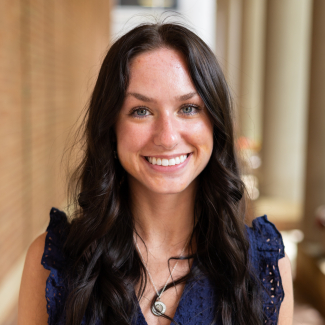Scallops, corals, and pteropods or “sea butterflies” are all different types of calcifying organisms, or those that use calcium carbonate to generate hard shells or exoskeletons. As the ocean becomes more acidic, these organisms cannot form their hard shells and skeletons as easily, and the calcium carbonate can even dissolve. Alison Novara, a 2022 EPP/MSI Scholar, spent her second summer internship at NOAA’s Geophysical Fluid Dynamics Laboratory studying whether ocean acidification could cause populations of these animals to collapse or change their habitat range.
Alison Novara, an EPP/MSI undergraduate scholar, during her 2023 summer internship research presentation. (Image credit: Ilam Shah)
Alison learned about Earth system models during her internship. Specifically, she used computer coding to create habitat range maps for each organism comparing historical and future predictions from GFDL’s Earth System Model 4.1. These maps provided insight into how their habitat ranges could potentially shift with ocean acidification and climate change impacts, such as temperature extremes and aragonite saturation state, a measure of carbonate ion concentration. Her analyses from this summer provide a preliminary prediction of how populations of these organisms may collapse or be displaced as impacts of ocean acidification and climate change continue to bear down on our marine life.
I am so thankful to the NOAA EPP/MSI scholarship program for continuing to allow me to pursue my interests in new ways and explore different methods of the study and conservation of our precious marine ecosystems.

Alison is a 2022 EPP/MSI undergraduate scholar majoring in marine biology at Nova Southeastern University


![A pteropod shell is shown dissolving over time in seawater with a lower pH. The image reads: Ocean acidification. How will changes in ocean chemistry affect marine life? CO2 absorbed from the atmosphere [into the ocean]. The chemical equation for carbon dioxide mixing with seawater shows how carbonate ions impedes calcification in pteropods. (Image credit: NOAA) A pteropod shell is shown dissolving over time in seawater with a lower pH. The image reads: Ocean acidification. How will changes in ocean chemistry affect marine life? CO2 absorbed from the atmosphere [into the ocean]. The chemical equation for carbon dioxide mixing with seawater shows how carbonate ions impedes calcification in pteropods.](/sites/default/files/styles/landscape_width_650/public/legacy/image/2019/Jun/pmel-oa-imageee.jpg?h=920929c4&itok=RrQRF2Ac)